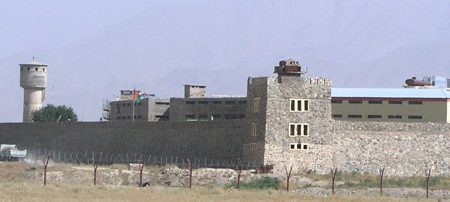
Rule of law is the lynchpin to long-term stability in Afghanistan. Yetthe military's tradition of steering clear of law enforcementactivities, especially evidence-gathering responsibilities, isweakening Afghanistan's already imperiled justice system.
A recommendation in Gen. Stanley McChrystal's
When international forces capture somebody -- during a battle, a housesearch, while on patrol -- they interrogate the detainee, gatherbiographical information, snap some photos, take finger prints, andwrite a brief report. The detainee, along with the information, isthen handed over to Afghan authorities for criminal investigation andprosecution (unless the person is released -- or kept at theU.S.-controlled Bagram detention facility).

The big three detaining powers in Afghanistan are the United States,United Kingdom, and Canada -- in that order. Some countries do betterthan others at gathering information. For instance, Canada sometimesconducts gunpowder resin tests. But military operations need toinclude more people who are trained in essential evidence gatheringtechniques, such as maintaining a chain of custody. The InternationalSecurity Assistance Force (ISAF) should establish uniform guidance onhow to collect information. And international forces should also takeinto account what Afghan judges and prosecutors regard as strongevidence.
Because these practices aren't in place, Afghan officials are handed avariety of different types of documents and evidence often ill-suitedfor Afghan courts. The Afghanistan Working Group on Conflict-RelatedDetentions, a group of Afghan human rights and legal aid organizationsworking on detention issues, has pointed out that the "informationthat ISAF states currently gather on detainees at the point of captureis often insufficient for Afghan prosecutors to use for prosecutions."
As a result, people who may in fact have been guilty have been setfree due to lack of evidence.
One Afghan law enforcement official confided in me that theinformation the United States provides "is not proof or evidence... TheU.S. needs to prepare the evidence in accordance with Afghan law. TheU.S. doesn't have the same law or the same crimes. U.S. troops need toknow our Constitution and laws. They should learn what kind ofevidence is best for Afghan law. Seven to eight years has passed andby now they should know the system." He also suggested the UnitedStates provide better witness lists.
Another problem is the rampant corruption within the justice systemthat allows criminals to bribe their way free. But the officialpointed out that with stronger evidence, it would be harder to hidethis corruption.
In late 2007, the United States began transferring Bagram detainees toa wing of the Pul-i Charkhi prison known as "Block D." More than 600have been transferred so far. The concept of handing detention powersover to the Afghans was commendable, but the destructive power of poorevidence in an already weak justice system quickly became apparent.
At Block D, witnesses rarely appear, defense lawyers are notified oftrials at the last minute, physical evidence is rarely produced, andjudges rely too heavily on weak U.S. evidence. An Afghan judge told mefrankly, if naively: "The evidence is based on information we get from[United States] and we are sure that people who were arrested arearrested for something they did wrong and we are sure that the U.S. isnot lying." None of this strengthens Afghanistan's rule of law.
ISAF detention policy is also deficient. The media and human rightsgroups rarely know what happens at the trials of ISAF detainees oncehanded over the Afghan custody. The guilty can often pay their way tofreedom while pre-trail detention and unfair trials condemn others toyears in prison. Canada, Denmark, the Netherlands, Norway, the UnitedKingdom, and the United States have signed agreements that allow themto monitor the treatment of the people they transfer. But even so,several detainees have alleged that they were tortured in Afghancustody after transfer.
One solution to the lack of sufficient evidence to convict -- a badsolution -- would be for Afghanistan to create its own indefinitedetention regime. Initially the United States proposed exactly this tothe Afghanistan government, and recommended that it establish reviewboards similar to those at Guantanamo Bay. This program would havelegalized a detention system with no adequate oversight in a countrywith rampant corruption -- a disastrous equation for rule of law.President Karzai rightly refused after his Attorney General insistedthat the plan would be unconstitutional.
Rooting out corruption and strengthening a justice system isn't easy.The United States and European Council are currently reassessing waysto improve on eight years of lackluster results. Part of this effortmust include international forces improving and standardizing theirinformation gathering techniques and taking into account the needs ofAfghan courts.
Honest Afghan prosecutors could then build stronger cases; and strongevidence makes it harder for corrupt judges and prosecutors to takebribes, tamper with evidence, and send innocent people to jail. ISAF,which is stuck knowing that corruption allows their transferreddetainees to bribe their way back to planting road side bombs, coulduse the evidence as leverage to confront the government when thishappens.